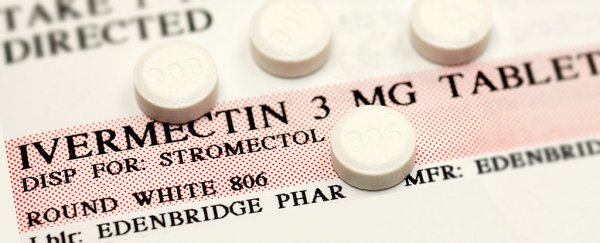Ivermectin is the active ingredient in many widely available anti-parasite medications used to treat infections of worms, scabies, and lice in humans and livestock.
Recently, it has gained popularity in some parts of the world as a potential COVID-19 treatment, despite a lack of scientific evidence for its benefits, and a substantial risk of harmful overdoses.
How does ivermectin work?
Ivermectin was developed from a species of Streptomyces bacterium found in the 1970s, the finding was a huge win for the livestock industry and for fighting numerous devastating illnesses around the world, eventually earning the researchers a Nobel Prize.
Ivermectin and its family of parasite-fighting compounds act selectively on a kind of chloride channel only found in invertebrates.
While this makes it a relatively safe drug for knocking out any creepy-crawlies in the body, it is possible to have a toxic reaction or overdose of this medication. At higher concentrations, ivermectin can interact with similar channels in vertebrates like us, interfering with nervous impulses and muscle control.
Can ivermectin treat COVID-19?
Over the past 50 years, researchers have found that ivermectin may have other interactions in the human body apart from just tackling parasites.
There have even been signs that ivermectin has antiviral effects in the lab on RNA viruses such as Zika, Hendra, and HIV1, however trials in animal models have been spotty to date.
Since ivermectin already had FDA approval for treating parasites, it seemed like a perfect candidate to test against the SARS-CoV-2 virus – as a potential medication that might limit viral replication in the human body.
Early in 2020, a laboratory study on cell cultures concluded that a single treatment could cause a 5,000-fold reduction in virus particle numbers within just two days. However, this is vastly different from actually using the drug in people.
Several influential studies on the potential benefit of ivermectin as a COVID-19 treatment have resulted in controversy, with independent researchers uncovering substantial scientific fraud in preprint papers that were widely publicized without having received peer review, but ended up being removed from preprint servers or retracted.
"My sincere opinion is that at least a third of the evidence supporting the use of ivermectin as a COVID-19 therapeutic is not just 'based on shaky data', but consists of studies that may never have happened at all," writes Australian epidemiologist Gideon Meyerowitz-Katz.
The latest evidence from a large clinical trial on several repurposed drugs that might be useful for COVID-19 treatment has shown no benefit for ivermectin. More studies are underway, however.
Despite fraud, controversies, and lackluster evidence, ivermectin has been popularized as a COVID-19 treatment around the world, with a number of medical professionals prescribing ivermectin to patients in the hope it might stave off a more serious infection.
If ivermectin has approval, and doctors are prescribing it, what's the harm?
Ivermectin has approval in many government jurisdictions for treating parasitic infections. None have approved it for treating COVID-19, and doing so can be dangerous.
Drug regulators such as the US FDA and Australian TGA have issued strict warnings against treating COVID-19 with ivermectin.
"There's a lot of misinformation around, and you may have heard that it's okay to take large doses of ivermectin. That is wrong," warns the FDA.
If ivermectin does have any antiviral benefits in people, clinical trials are needed to determine precisely what dosage can provide the greatest benefits with the fewest risks, for example. There could be conflicts between medications commonly used to treat advanced cases of COVID-19, which would make either medication ineffective, or worse, cause harm.
Read the full US FDA warning here.
All Explainers are determined by fact-checkers to be correct and relevant at the time of publishing. Text and images may be altered, removed, or added to as an editorial decision to keep information current.
